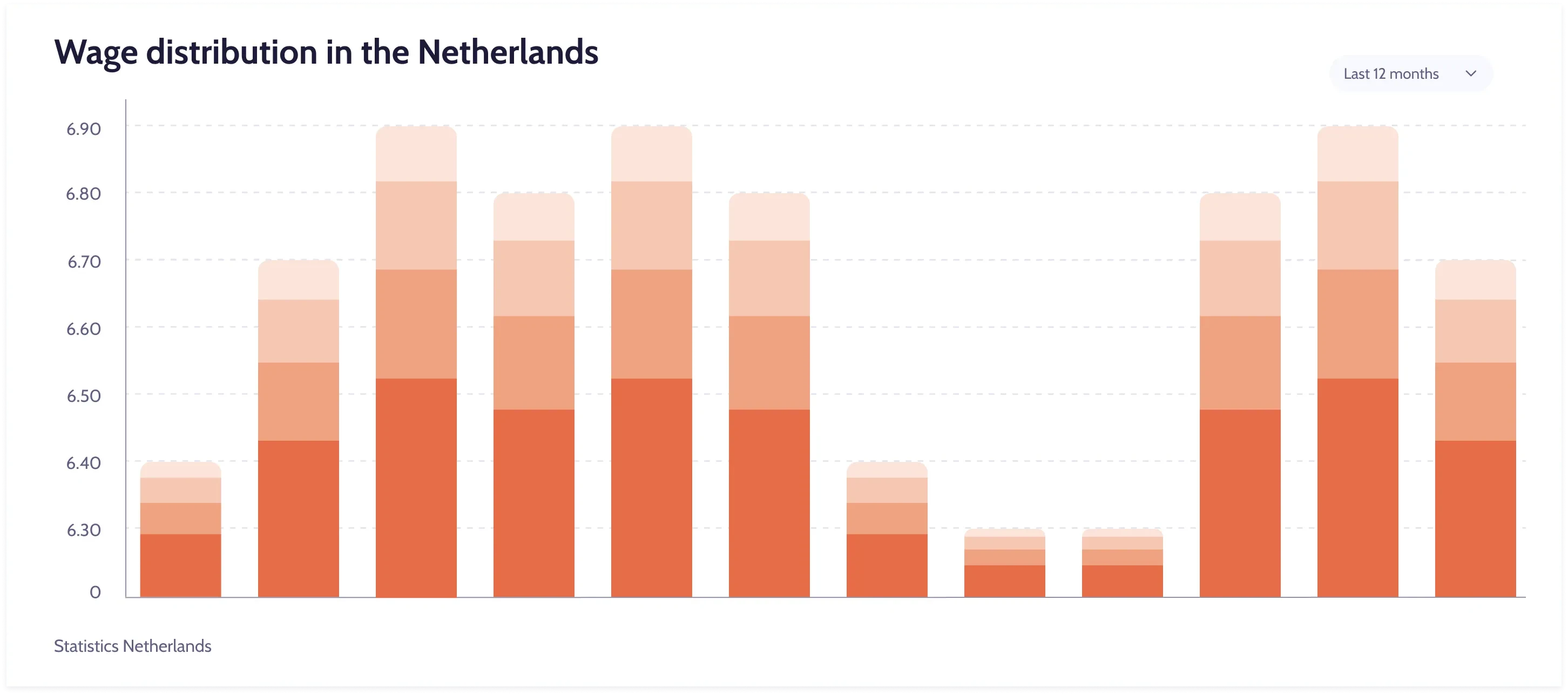Navigating the complexities of Dutch payroll can be daunting, especially for expats and employers new to the Netherlands who might also hire expats. Understanding salary trends, tax breaks, and employee benefits is crucial for making informed decisions. In this blog, we'll break down the salary trends, influential factors on salary structures, and how to take advantage of tax breaks in the Netherlands.
Analyzing Salary Trends in the Netherlands
In recent years, salaries in the Netherlands have risen, influenced by inflation, industry growth, and a demand for specialized skills. According to the Government of the Netherlands explanation on 1 January 2024, the minimum wage on salaries fixed by hour. Everyone aged 15 and over must be paid at least the applicable hourly minimum wage. As of the 2024 there is no longer determined daily, weekly or monthly minimum wage.
Despite the country's relatively small size, salaries vary widely depending on the city, sector, and specific role. Here's an overview of some of the trends and salaries across different industries and job roles:
High-Demand Jobs and Their Salaries
1.Tech Sector: The Dutch tech sector has grown significantly, increasing salaries for software developers, data scientists, and IT specialists.
Software Developers: €55,000 to €85,000 annually
Data Scientists: €60,000 to €90,000 annually
2.Healthcare: The healthcare sector remains robust, with a steady demand for doctors, nurses, and medical specialists.
General Practitioners: €75,000 to €120,000 annually
Nurses: €30,000 to €50,000 annually
3.Engineering: Mechanical and electrical engineers are in high demand, particularly in renewable energy.
Mechanical Engineers: €40,000 to €65,000 annually
4.Finance: Financial analysts, accountants, and auditors are integral to the growing startup ecosystem.
Financial Analysts: €50,000 to €80,000 annually
For more detailed benchmarks, check out this salary benchmark tool.
Inflation's Impact on Salary
In September 2024, Statistics Netherlands (CBS) announced that the annual inflation rate in the Netherlands determined 3.5%, edging lower from 3.6% in the previous month. Due to inflation, many companies have been forced to increase wages to retain talent. The average annual salary increase has hovered around 6%, with some sectors seeing even higher adjustments.
In August 2024, wages in the Netherlands increased by 6.7% compared to the same month in the previous year. Historically, wage growth in the Netherlands averaged 2.45% between 1991 and 2024. According to Statistics Netherlands, the highest recorded growth was 6.9% in November 2023, while the lowest was 0.44% in May 2005.

Influential Factors on Salary Structures in the Netherlands
While job type and sector are key drivers of salary, several other factors play a role in determining how much an individual can earn in the Netherlands:
Location:
The location significantly impacts salary. Major cities like Amsterdam, The Hague, and Rotterdam tend to offer higher wages to offset the higher cost of living. However, salaries can be lower in smaller cities and rural areas.
Experience and Age:
Experience and age are critical in shaping salary levels. Individuals with more years of experience in a field, particularly in specialized roles, can expect higher compensation.
Junior roles: €30,000 to €45,000 annually
Senior roles: €70,000 to €100,000 annually
Skills and Education:
Professionals with in-demand skills, such as coding, machine learning, and digital marketing, typically command higher salaries. Additionally, having advanced degrees or certifications can result in higher compensation packages.
Gender Pay Gap:
There remains a gender pay gap in the Netherlands, though it has been narrowing. According to the most recent data, women earn approximately 14% less than men in comparable roles. The government and companies are taking steps to reduce this gap.
Employment Type:
Whether an employee has a temporary or long-term contract also influences salary. Those on long-term contracts often receive additional perks such as bonuses, holiday pay, and pension contributions.
Working Hours:
Full-time employees typically earn more than part-time workers. The Dutch government, however, promotes flexible working arrangements, which means many employees opt for reduced hours without a significant dip in income.

Dutch Tax Breaks Explained for Expats
One of the most attractive aspects of working in the Netherlands is the variety of tax benefits available to expats. These tax breaks are designed to make relocation financially appealing while boosting disposable income.
The 30% Ruling
During Prinsjesdag 2024, the government revealed upcoming changes to the 30% ruling. Starting in 2027, employers will be permitted to offer a maximum of 27% of eligible employees' wages tax-free, rather than the current 30%. Additionally, employees will need to meet a higher income threshold to qualify. These amendments have not yet been implemented. Learn more about these upcoming changes.
Expats should ensure they apply for this ruling within four months of starting their job to maximize the benefit.
Tax Exemptions for Specific Costs
The Dutch tax system allows for various other deductions and exemptions:
Healthcare expenses: Certain medical expenses not covered by insurance can be claimed as deductions.
Education costs: Costs related to furthering your education or career development may qualify for deductions.
Commuting expenses: If you travel to work using public transport, part of these costs can be tax-deductible.
By utilizing these tax breaks, expats can significantly boost their net salaries and overall compensation. For more information on tax advantages and expat payroll in the Netherlands, get in contact with the experts at Unusual Payroll.
Finding Trustworthy Payroll and Employer of Record Solutions in the Netherlands
For businesses looking to hire in the Netherlands, navigating payroll can be challenging due to the complexity of tax regulations, salary structures, and employment benefits. Choosing the right payroll solution ensures compliance and attracts top talent.

What to Look for in Payroll Services
Compliance with Dutch Laws: A reliable payroll provider will ensure your company adheres to Dutch labor laws, tax regulations, and employee benefits requirements.
Integration with HR Systems: Many payroll solutions offer integration with HR software, streamlining employee management, tax filing, and compensation payments.
Transparent Pricing: Look for payroll services that offer transparent pricing with no hidden fees. Some offer specialized packages for small to medium businesses, which can be cost-effective.
Understanding salary trends, tax breaks, and payroll solutions in the Netherlands is crucial for employees and employers. Expats and businesses can maximize their financial benefits by staying informed about current salary benchmarks and taking advantage of the generous tax incentives. Whether navigating the Dutch employment market or setting up a business, having the right payroll management will ensure a smooth process.
Explore payroll services that offer tailored solutions for temporary and long-term contracts and specialized support for expats. For more insights on payroll management in the Netherlands, check this guide or contact trusted payroll and employer of record service provider, Unusual Payroll.






